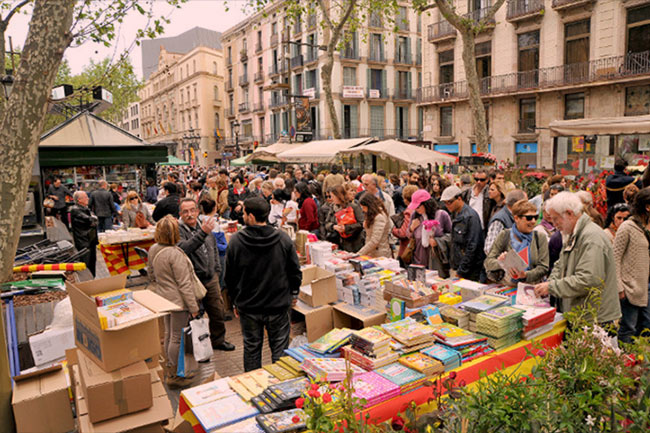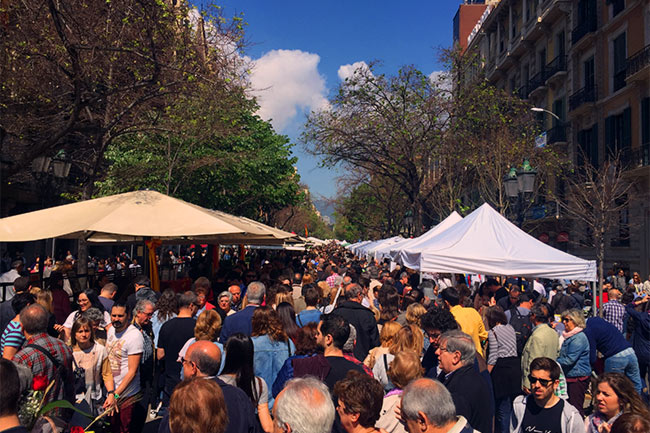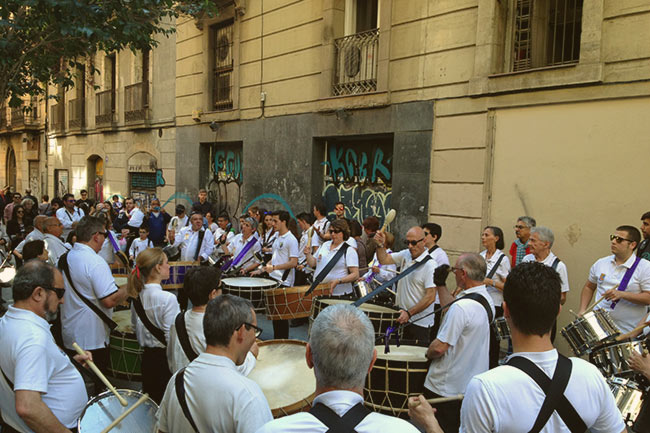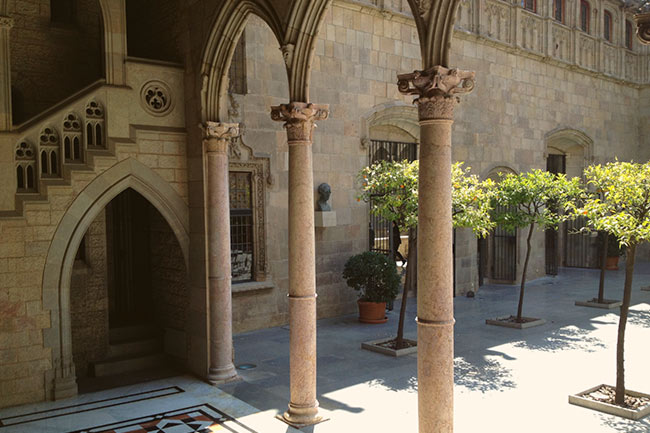In Barcelona and the rest of Catalonia, April 23rd is Sant Jordi’s Day, one of the coolest days of the year to be around. It is a festivity that binds together local legend, the Catalan Lovers Day and passion for books and literature.
Lovers are expected to exchange gifts in the form of roses and/or books this day, as well as bring roses for workmates and relatives. Stands selling roses can be found in every corner of the city and everywhere else in the region all day long, and commuters and students can be seen carrying roses on their way to work or school
Early birds typically go fetch their roses and leave it home for their lover before leaving. Parents also buy books for their children, and vice versa. During these days, most schools and city libraries hold literary contests.
The main streets of Barcelona and other cities are transformed into open-air bookstores, and plenty of literature-related events take place amidst the colorful chaos.
The whole city breathes culture for the day. Books mean knowledge, education and open-mindedness; key components of societies that embrace cultural diversity and understanding of new and foreign ideas without prejudice. I find this festival something very easy to be proud of, and love the way Catalan people engage in it.
While giving a rose for your lover is a matter of choosing a shape, a smell and a color, choosing the right book for someone you care about is quite an exercise of really knowing his personality, hobbies and dreams. A book is a very versatile gift, and whichever book you end up giving reflects a lot of things about your relationship.
Additionally, special focus is put on the best-selling lists by the Catalan media, which tailor lists of best-selling Catalan and Spanish fiction and non-fiction.


Origin of the festival
Sant Jordi -or Saint George- is the patron saint of Catalonia. The event finds its origin int the legend of Sant Jordi, a horse-riding cavalier who saved a village from a dragon.
The dragon refrained himself from attacking the villagers in exchange for daily supplies of food. Once the village ran out of food, the dragon demanded one child to be sacrificed every day to satisfy his appetite. Forced to agree to his terms, the villagers opted for a lottery through which to select a child every day, so they wrote all children’s names on papers and put them in a hat.
The king was chosen to select a paper from the hat, and he took the paper with his daughter’s name on it. As the princess journeyed to the dragon’s den, Sant Jordi arrived at the village and was informed of the situation. He hurried to save the princess, and killed the dragon by stabbing his word in its heart. A rose bush grew from the spilled blood of the dragon, and Jordi gave the biggest rose to the princess.
Many stands in the city feature imaginary from the legend, so dragons, princess and medieval soldier costumes can be seen everywhere. Additionally, the date marks the death anniversary of both William Shakespeare and Miguel de Cervantes, two key authors in the history of European literature.

Things to do
- Walk down the most crowded streets of the city center, including Passeig de Gràcia, Rambla de Catalunya and Les Rambles. Leave your bike or skate at home, as it might be impossible to make your way around on these.
- Get your book signed. The most popular writers of Catalonia and the rest of Spain, as well as a number of foreign authors, carry out signing sessions in several locations around the city center.
- Find cool book-selling stands that have a different approach to the book business. Typically found around the Sant Jaume square, the Gothic quarter and other locations around the city center, some stands don’t sell books directly, but rather: exchange books, give away books in exchange of small challenges to be performed by the buyer (eg. kiss your boyfriend and get a free book!), organize book-reading sessions, give away books to people named Jordi or Georgina, etc.
- Visit the city hall or the Parliament of Catalonia for free. Other places that open their doors to the public include the Palau de la Música, Palau Güell and the Museum of Natural History. Expect long queues!
- Live music! Well-known and emerging local artists offer free-entry gigs in different locations of the city, most notably in the old Estrella Damm Brewery building.
- Publishing companies organize VIP parties in expensive buildings. Though they are invitation-only, one can meet the high spheres of the Catalan literature scene, politicians and publishing business.
- Eat Pa de Sant Jordi, or Sant Jordi Bread.
- …and many, many more! Writing courses, poetry slams, theme-decorated restaurants… Lose yourself around and dive into the colorful world of books and roses, and its many, many events!

More information on free-entry events and live shows taking place every year is usually found on the official website of the city hall and on Time Out Barcelona.
- Where: Barcelona, and the rest of Catalonia.
- When: April 23rd.